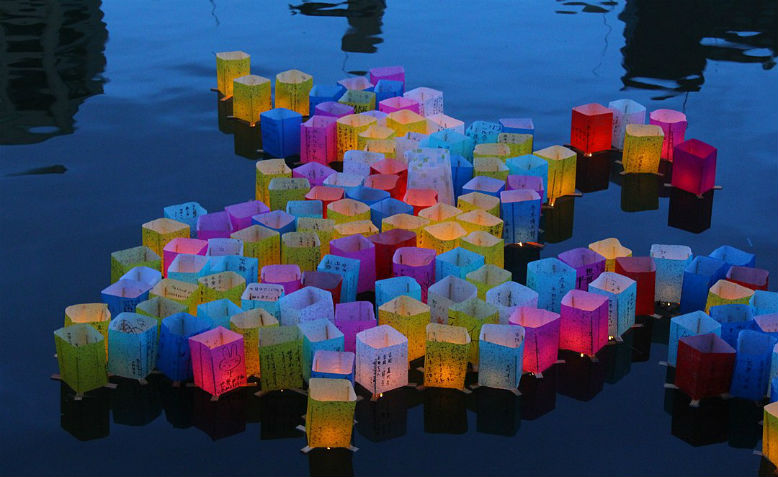 Lanterns with peace messages floating on the waters of the Motoyasu River. Photo: Flickr/Richard Riley
Lanterns with peace messages floating on the waters of the Motoyasu River. Photo: Flickr/Richard Riley
Anti-war and anti-nuclear activism is at the heart of remembrance in Hiroshima, report Clare Solomon and Steph Pike
At 8.15am yesterday a minute’s silence was held in Hiroshima Peace Park to mark 74 years of suffering in Hiroshima. More than 50,000 survivors, relatives and members of the public gathered in front of the Memorial Cenotaph for the Hiroshima Peace Memorial Ceremony.
Delegates came from over 70 countries and from right across Japan to pay their respects and remember the victims of the Atom bomb that destroyed Hiroshima and left a legacy of suffering.
Laying of wreaths and the minutes silence was followed by speeches including from the Prime Minister Shinzo Abe and school children.

Events continued all day throughout the park organised by groups from a wide spectrum of supporters: religious groups, peace campaigners, art, dance and musical groups, school and education campaigns.
Every year the day culminates in the evening with a lantern ceremony, when thousands of paper lanterns are lit and sent floating on the Motoyasu River carrying written messages of peace.
It was an important and emotional reminder of the importance of the continuing campaign to rid the world of nuclear weapons, and to oppose all wars.
The Peace Flame will burn in the centre of Hiroshima Peace Park until all nuclear weapons have been destroyed. The only wish of the Hiroshima and Nagasaki survivors is to see the end of all nuclear weapons. They have initiated a petition which currently has nearly 9 million signatures, they are aiming for a billion. Please sign their petition here.
The Japanese anti-nuclear and anti-war message was loudly heard today with a variety of groups marching and protesting about the government’s lack of action after the Fukushima nuclear plant disaster, and calling for impeachment of the Prime Minister for his campaign to remove the peace clause from the Japanese constitution.
To get a feel of how the people of Hiroshima responded to the dropping of the Atom bomb in 1945, try to get hold of a copy of the 1953 film entitled ‘Hiroshima’ - this brilliant and powerful anti-war film was made by 88,000 Hiroshima and Nagasaki survivors and funded by the Japanese Teachers’ Union as no film studio would touch it.


